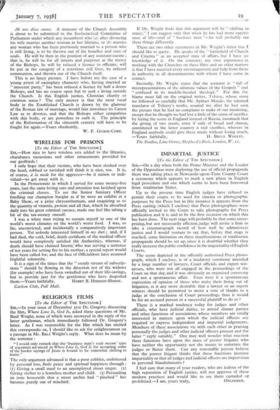IMPARTIAL JUSTICE
[To the Editor of THE SPECTATOR.] SIR,—On a day when both the Prime Minister and the Leader of the Opposition were deploring the use of official propaganda there was taking place in Newcastle-upon-Tyne County Court a ceremony which appears to mark a new phase in English legal procedure and one which seems to have been borrowed from totalitarian States.
Up to the present time English judges have refused to permit their courts to be used for cinema or photographic purposes by the Press but in this instance it appears from the Press cutting (which I enclose) that Press photographers were officially invited to the Court to take photographs for Press publication and it is said to be the first occasion on which this has been done. The next stage will probably be that some enter- prising, but not necessarily efficient, judge will invite a firm to take a cinematograph record of how well he administers justice and I would venture to say that, before that stage is reached, some limitation on these manifestations of totalitarian propaganda should be set up, since it is doubtful whether they really increase the public confidence in the impartiality of English Courts.
The scene depicted in the officially authorised Press photo- graph, which I enclose, is of a laudatory ceremony attended by a large number of lawyers, Court officials and expert wit- nesses, who were not all engaged in the proceedings of the Court on that day,and it was obviously an organised ceremony and not a spontaneous affair. Even were it a spontaneous expression of opinion of those who make their living out of litigation, is it any more desirable that a lawyer or an expert witness should be permitted to move a vote of thanks to a judge at the conclusion of Court proceedings than it would be for an accused person or a successful plaintiff to do so ?
There is a marked tendency today for judges and other officials, who have judicial duties, to attend dinner parties and other functions of associations whose members are vitally interested in matters upon which the judicial officers are required to express independent and impartial judgements. Members of these associations vie with each other in praising personally the judges and other judicial officers present and the latter " reply suitably." One may well wonder what reaction these functions have upon the mass of poorer litigants who have neither the opportunity nor the means to entertain the judges or flatter them. Can any reasonable person believe that the poorer litigant thinks that these functions increase impartiality or that all judges and judicial officers are impervious to personal_ blandishments ?
I feel sure that many of your readers, who are jealous of the high reputation of English justice, will not approve of these modem practices and would like to see them curtailed or
prohibited.—I am, yours truly, ONLOOKER.









































 Previous page
Previous page